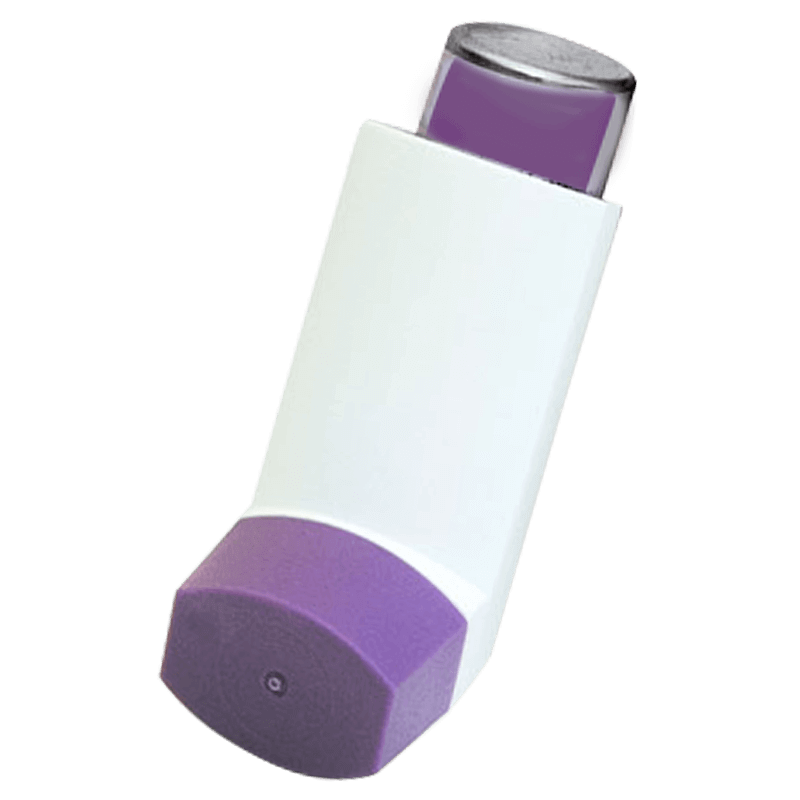Always Read The Patient Information Leaflet
Medicines can cause side effects. Always read the leaflet that comes with your medication and report any side effects to your pharmacist. Stay informed—order safely today!
This product requires an account to purchase. Please login for further details.
Need Express Delivery? Order now!
Westbury Chemist is a GPhC-registered pharmacy (Registration No. 1041186) operated by qualified pharmacists, providing professional and regulated healthcare services
Combisal is a white inhaler with a purple cap that you use twice daily. It combines salmeterol and fluticasone to help prevent asthma symptoms over the long term.
Salmeterol helps to keep your airways open, while fluticasone reduces inflammation in your lungs. Together, they work to relieve and prevent asthma symptoms like breathlessness and wheezing.
Since Combisal is a medication you take daily, you'll still need to keep your rescue inhaler nearby in case you experience sudden asthma symptoms or have an attack.
Combisal has two active ingredients: salmeterol and fluticasone. Regular use of a Combisal inhaler can help prevent asthma attacks and ease breathing problems over time.
Salmeterol is a bronchodilator, which helps to relax the muscles in the lungs, making it easier to breathe.
Fluticasone is a type of corticosteroid. It works by reducing the release of cytokines from cells in the lungs. Cytokines are chemicals that can lead to inflammation and irritation.
The two ingredients work well together for the first 12 hours. For the best results, it's recommended to use your inhaler in the morning and again in the evening.
Combisal contains 25mcg of salmeterol and is available with three different doses of fluticasone. After assessing your health, your prescriber will advise which dose is best for the severity of your asthma.
The doses are:
Every inhaler contains 120 puffs.
Combisal and Seretide are very similar. They contain the same active ingredients and work in the same way to prevent asthma symptoms.
Seretide is available in two types: the Seretide Evohaler and the Seretide Accuhaler. The Evohaler resembles a typical inhaler with a canister filled with liquid. On the other hand, the Accuhaler is a round disc containing dry powder and is 'breath-actuated', meaning you simply inhale to use it.
Combisal is often the more affordable choice for both pharmacies and the NHS. It's also less expensive than Seretide when purchased through Treated.
Using a combination inhaler such as Combisal is a key part of preventing asthma symptoms. Fluticasone acts as the preventer, gradually building up protection, so you should start to see an improvement after a few days.
If you use Combisal regularly, fluticasone will significantly decrease the inflammation in your lungs. After a few weeks, you'll notice improvements like fewer trigger reactions, better sleep, and easier breathing.
If you use too much of your Combisal inhaler, let your doctor know. Taking larger doses might decrease the production of steroid hormones by the adrenal gland, which can lead to a quicker, irregular heartbeat and dizziness.
If you forget to use your inhaler, simply take your next doses at the regular time.
Don't lower your dose or stop taking Combisal suddenly without consulting your doctor first.
Headaches are a very common side effect when using the Combisal Inhaler, but they should lessen as you carry on with your treatment.
Another possible side effect is thrush, but with the right aftercare, you can help lessen the chances of it occurring.
If you've been diagnosed with COPD (chronic obstructive pulmonary disease), you might find you catch more colds. While this is noted as a possible side effect of this inhaler, it might not be directly caused by using it.
There are several alternatives to Combisal that have the same active ingredients and function in the same way as a combination inhaler. Your clinician will discuss which treatment is best for you, based on the severity of your asthma.
Sereflo is another cost-effective choice, similar to Combisal. AirFluSal is like Seretide as it also comes in two forms – a liquid canister and a dry powder disc.
Other liquid inhalers that have salmeterol and fluticasone include Sirdupla and Avenor.
Other dry powder inhaler discs include Stalplex and Fixkoh Airmaster.
There are also dry powder inhalers available that resemble standard inhalers, such as Seffalair Spiromax and Fusacomb Easyhaler.
Symbicort is another type of combination inhaler, but it includes different ingredients: budesonide and formoterol. They function in the same way to help prevent and ease asthma symptoms.
Yes, but Combisal isn't approved for treating COPD. Chronic obstructive pulmonary disease (COPD) refers to a group of lung conditions that make breathing difficult. One way to manage COPD is by using a steroid inhaler over the long term.
Combisal includes the corticosteroid fluticasone, which helps reduce lung inflammation and ease breathlessness in people with COPD. However, there are other inhalers that are more suitable and specifically licensed for COPD patients.
Yes, that's correct. Although Combisal is a combination inhaler and includes the relieving ingredient salmeterol, it is designed to prevent long-term asthma symptoms. If you experience a sudden asthma attack, Combisal won't act quickly enough to provide relief.
It's a good idea to always have a fast-acting reliever inhaler, like salbutamol, with you. These are usually the blue ones. Try to keep one nearby just in case you need it.
The only combination inhaler you can use during a sudden asthma attack is a Maintenance and Reliever Therapy (MART) inhaler.
You'll need a prescription for Combisal because our clinicians must ensure it's the safest option for you and that you're on the correct dose for your asthma.
Combisal isn't right for everyone, and there are a few things you should be aware of before using it.
Here's all the information you need. If you have any more questions, feel free to speak with your clinician, who will be glad to help.

At Westbury Chemist, we prioritise your security and peace of mind when shopping with us. Here's how we ensure a safe and reliable experience:
Shop with confidence at Westbury Chemist, where your safety and satisfaction come first.
Medicines can cause side effects. Always read the leaflet that comes with your medication and report any side effects to your pharmacist. Stay informed—order safely today!

Superintendent pharmacist with 20+ years of experience. Specialises in acute respiratory diseases, UTIs, musculoskeletal issues, and more

Independent Prescribing Pharmacist specialising in ENT, hypertension, and weight loss management

Independent Clinical Prescribing Pharmacist with expertise in asthma, COPD, and long-term disease management
OPEN till
OPEN
OPEN

